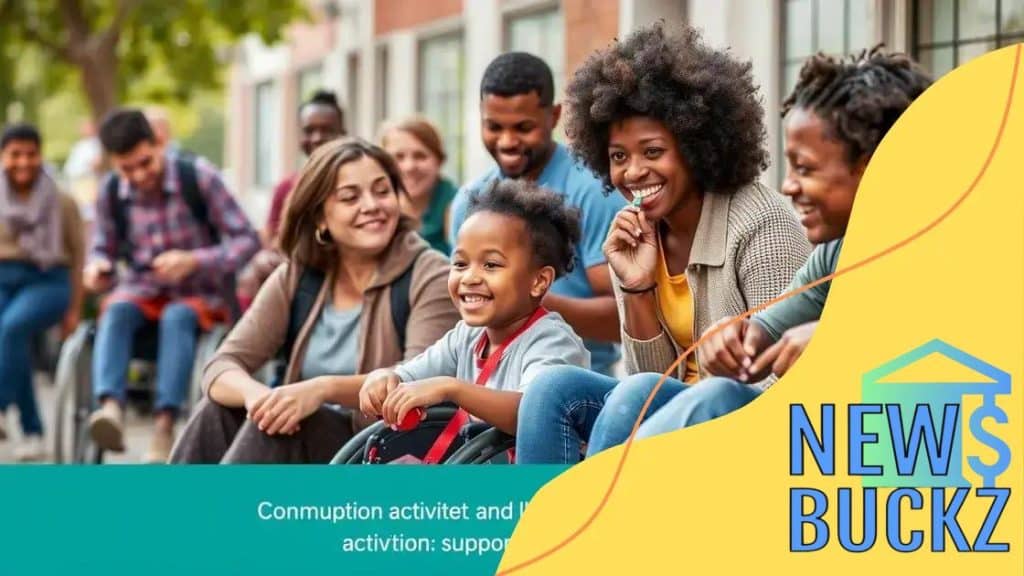Federal support for individuals with disabilities in 2025

Anúncios
Federal support for individuals with disabilities in 2025 includes financial assistance, medical aid, employment services, and educational resources that enhance independence and improve quality of life within communities.
Federal support for individuals with disabilities in 2025 is poised to significantly enhance quality of life. Ever wondered how these initiatives can open doors for many? Let’s dive into what to expect.
Anúncios
Understanding federal support programs
Understanding the federal support programs available for individuals with disabilities is crucial. These programs aim to provide assistance, ensuring that everyone has an equal opportunity to thrive.
Types of Federal Support Programs
Federal support programs can vary significantly. Each program is designed to meet specific needs and circumstances of individuals with disabilities. Let’s explore some of the main categories:
- Financial Assistance: This includes direct financial support to help with living expenses.
- Medical Aid: Programs that provide necessary medical care and prescriptions at little to no cost.
- Employment Services: Assistance with job training and placement to help individuals enter the workforce.
- Education Support: Financial aid and resources for students with disabilities to pursue higher education.
These programs not only provide essential resources but also empower individuals to pursue their goals.
Anúncios
Another important aspect is eligibility. Each federal support program has its own set of criteria that applicants must meet. Understanding these criteria can help you or someone you know access the resources they deserve. For example, some programs might require income verification or documentation of the disability.
How to Apply for Federal Support
Applying for federal support is often a straightforward process, but it can vary by program. Here are typical steps to consider:
- Gather Documents: Collect necessary documents such as identification, proof of income, and medical records.
- Fill Out Applications: Complete the required forms accurately to prevent delays.
- Seek Assistance: Don’t hesitate to ask for help from professionals who specialize in these applications.
Being well-informed about these steps can make the application process smoother. Federal support programs play a significant role in enhancing the quality of life for individuals with disabilities, offering them the opportunity to lead more independent and fulfilling lives.
Eligibility criteria for assistance
Understanding the eligibility criteria for assistance can be the key to accessing vital resources. Each federal support program has its unique requirements, which are designed to ensure the aid goes to those who need it most.
Common Eligibility Requirements
While criteria can vary, many programs share similar requirements. Here are some common factors that typically determine eligibility:
- Disability Documentation: Valid proof of disability is essential for most programs.
- Income Level: Many programs assess income to classify need, often requiring applicants to meet specific financial thresholds.
- Residency Status: Being a U.S. citizen or meeting certain residency criteria is usually mandatory.
- Age Limits: Some programs may have age restrictions, focusing on children or adults in particular age groups.
It’s crucial to gather all necessary documentation beforehand. This can speed up the application process significantly. Applicants should also pay attention to renewal requirements, as some benefits may need to be reevaluated regularly.
Special Considerations
In addition to standard criteria, some programs offer flexibility based on individual circumstances. For example, if an applicant experiences a sudden change in life, such as a medical emergency, they may qualify for an expedited process. Understanding these nuances can provide pathways to support that might not be immediately apparent.
While navigating the eligibility criteria can seem overwhelming, various resources exist to assist applicants. Community organizations, social workers, and government agencies can provide guidance, making the process less daunting. Always reach out for help if needed, as these resources are in place to support individuals with disabilities in accessing the benefits that will improve their lives.
Types of support available

When discussing the types of support available for individuals with disabilities, it is essential to recognize the variety of programs designed to address different needs. These support options can provide crucial assistance in daily life, helping individuals achieve greater independence and quality of life.
Financial Support
Financial assistance is one of the most critical aspects. Various programs offer monetary help to those who qualify.
- Social Security Disability Insurance (SSDI): This program provides benefits to individuals who cannot work due to a disability.
- Supplemental Security Income (SSI): A needs-based program offering financial support to low-income individuals with disabilities.
- Veterans Benefits: Disabled veterans may access additional financial support through specific programs designed to aid their unique needs.
Financial support can help cover living expenses, medical costs, and other essential needs.
Medical Assistance
Along with financial help, medical assistance is also available through different programs. Access to proper medical care is vital:
- Medicaid: This government program helps low-income individuals, including those with disabilities, cover healthcare costs.
- Medicare: Available to individuals aged 65 and older, it also serves younger people with disabilities after 24 months of SSDI eligibility.
- State-specific programs: Many states provide additional healthcare services tailored to local needs.
Such medical supports help ensure that individuals receive necessary treatments and medications.
Employment Support
Employment services are critical in fostering independence. These may include:
- Job Training Programs: Designed to equip individuals with disabilities with necessary skills.
- Job Placement Services: Helping individuals find suitable work opportunities.
- Workplace Accommodations: Employers are encouraged to provide reasonable accommodations to help employees succeed.
Employment support allows individuals with disabilities to contribute to society, enhancing their self-sufficiency.
Education support is also vital for many individuals. Various programs help students with disabilities obtain financial aid, access resources, and receive special accommodations during their education.
Understanding the different types of support available helps individuals navigate their options and find the assistance best suited for their needs.
Impact of federal support on communities
The impact of federal support on communities is significant and wide-ranging. Programs aimed at individuals with disabilities not only assist those in need but also enhance the fabric of entire communities. Understanding this impact helps illustrate the importance of such support.
Economic Growth
When individuals with disabilities receive support, it stimulates local economies. Financial assistance allows families to invest in goods and services, aiding local businesses. Additionally, when individuals are supported into employment, they contribute to tax revenues and the economic base.
- Job Creation: As demand for services grows, businesses may hire more employees.
- Increased Spending: Families with financial support tend to spend more on essentials and leisure.
- Community Development: Enhanced economic stability leads to better community infrastructure.
All these factors contribute to a thriving community where everyone can prosper together.
Social Inclusion
Federal support programs also promote social inclusion. When individuals with disabilities have access to resources, they can engage actively within their communities. Participation in community events, educational programs, and social activities becomes more attainable.
This engagement fosters a sense of belonging. Community members learn from one another and develop empathy. As barriers are broken down, different perspectives enrich the group, leading to stronger ties.
Improved Quality of Life
Beyond economic and social dimensions, federal support enhances the overall quality of life for individuals and communities. Access to healthcare, education, and employment opportunities enables individuals to thrive.
- Health Outcomes: Improved access to healthcare leads to better health outcomes for individuals.
- Educational Attainment: Support allows for higher levels of education and career advancement.
- Reduced Isolation: Community participation decreases feelings of loneliness and isolation.
Ultimately, when individuals with disabilities flourish, communities as a whole benefit. The positive ripple effects promote sustainability, empathy, and solidarity among all residents.
How to navigate the application process
Navigating the application process for federal support can be a daunting task. However, with the right information and a step-by-step approach, individuals can find success in securing the assistance they need.
Gather Necessary Documents
Before starting the application, it’s essential to gather all required documents. Having everything on hand ensures a smoother experience:
- Identification: A government-issued ID can verify your identity.
- Proof of Disability: This may include medical records or letters from healthcare providers.
- Financial Information: Recent tax returns and pay stubs will often be necessary to assess income.
Collecting these documents beforehand can save time and avoid delays during the application process.
Understanding the Application Form
Each program will have its unique forms and applications. Familiarizing yourself with the specific forms can enhance understanding:
- Read Instructions Carefully: Each application comes with guidelines. Following these closely is crucial.
- Take Your Time: Completing the forms accurately is essential. Rushing can lead to mistakes.
- Seek Help if Needed: If something is unclear, don’t hesitate to ask for assistance from professionals or community organizations.
Taking these steps helps ensure that your application is complete and correct.
Submitting the Application
Once you have completed the forms, it’s time to submit your application. Pay attention to the following points:
- Submission Methods: Review how to submit your application, whether online, by mail, or in person.
- Keep Copies: Always make copies of your application and any supporting documents for your records.
- Check for Confirmation: Ensure that you receive confirmation of your application submission.
Being organized during this stage can prevent issues later on.
Follow Up
After submitting the application, following up is an important step. This keeps your application on track and shows your interest. Here are some tips:
- Mark Your Calendar: Note down when to check the application status.
- Be Patient: Understand that processing times can vary widely.
- Contact the Agency: If you haven’t heard back within the expected timeframe, reach out to inquire about your application status.
Being proactive can help you stay informed about your application progress. Navigating the application process for federal assistance is made easier with careful preparation, comprehension of requirements, and ongoing diligence.
FAQ – Frequently Asked Questions about Federal Support for Individuals with Disabilities
What are the main types of federal support available?
The main types of federal support include financial assistance, medical aid, employment services, and educational resources.
How can I verify my eligibility for federal support?
Eligibility can often be verified through documentation such as proof of disability, income statements, and residency status.
What should I prepare to apply for federal assistance?
Gather necessary documents including identification, financial information, and proof of disability to facilitate a smooth application process.
How can federal support impact my community?
Federal support fosters economic growth, social inclusion, and improves the overall quality of life for individuals and communities.





